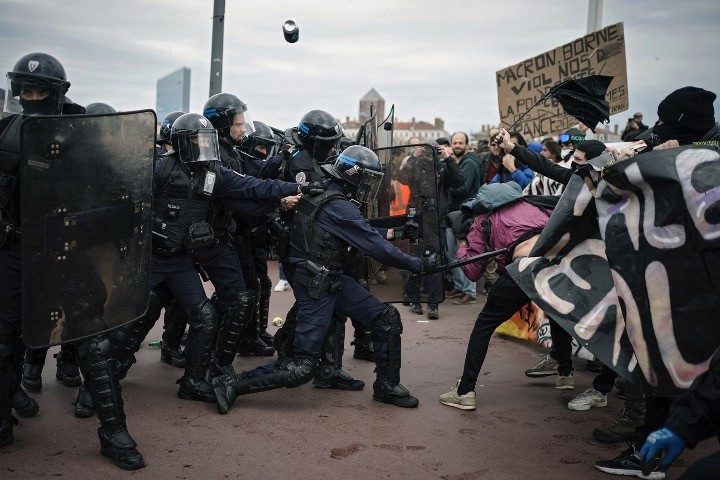
On Thursday, French citizens unhappy with new pension reforms announced by President Emmanuel Macron took to the streets to voice their displeasure. Violent riots, including the setting of fires and clashes with police, have occurred in various French cities, with Interior Minister Gérald Darmanin reporting that at least 172 protesters have been arrested. Close to 150 police officers have been injured in incidents all over the nation.
“There are thugs, often from the far-left, who want to bring down the state and kill police officers,” Darmanin said.
Last week, Macron used a controversial method known as Article 49.3 of the French Constitution to bypass the National Assembly, where he was unsure of a positive outcome in a vote for his plan to reform France’s pension system. France’s Senate approved of the reforms, the most controversial of which was a raise in the retirement age from 62 to 64.
On Monday, Macron survived a no-confidence vote in the National Assembly. This was their last-ditch attempt to derail the new pension reforms. The no-confidence measure received 278 votes in the Assembly — just nine votes short of the majority needed to remove Macron from power.
Unions have been on strike in France since January over the proposed pension reforms. Garbage lies rotting in piles all over the nation, and transportation has come to a standstill while key shipments of supplies go undelivered, among them fuel. Train and air travel has also been affected.
In fact, French trade unions bear a good amount of the responsibility for the protests, often organizing the events and blaming Macron for the violence.
“This is a response to the falsehoods expressed by the president and his incomprehensible stubbornness” said Marylise Leon, deputy secretary general of the French Democratic Confederation of Labour (CFDT). “The responsibility of this explosive situation lies not with the unions but with the government.”
Macron claims that the reforms are necessary for France’s pension system to survive.
“This reform isn’t a luxury, it’s not a pleasure, it’s a necessity,” Macron said in the wake of surviving the no-confidence vote. “Do you think I enjoy passing this reform? No.”
The French president felt the need to make the reforms since the nation’s birth rate has declined while pensioners are living much longer. France’s “pay-as-you-go” system makes it impossible for the current workers to pay for the pensions of the retired.
“The longer we wait, the more [the deficit] will deteriorate,” Macron pointed out.
And on Thursday evening, frustration with the Macron government boiled over into the streets. Over a million French citizens took part in the riots.
In Bordeaux, the town hall was set on fire, although the blaze was quickly put out.
In Paris, thousands engaged in a “mostly peaceful” protest. As the night went on, however, those protesters remained engaged with the police and began setting fire to newsstands and garbage cans.
France 24’s Catherine Norris Trent reported: “Really violent scenes at the Paris protest today against the French govt’s pension reforms. Tensions flared from 4pm onwards and riot police fired tear gas and charged several times.”
Those upset are angry with Macron for what they see as his flippant manner of addressing the pension problem and his use of Article 49.3 to circumvent the will of the National Assembly.
“Many on the streets of Paris I spoke to feel even more defiant after Macron’s TV interview yesterday,” Trent stated.
Also in Paris, groups of “Black Bloc” anarchists went on a spree of destruction, smashing shop windows, destroying street benches and chairs, and even ransacking a McDonald’s restaurant. Riot police were forced to use tear gas and stun grenades to disperse the violent mob.
Close to 80 arrests were made in Paris alone on Thursday.
Reports of violent protests came from all over the country, including in Nantes, where thousands marched in torchlight to protest the pension changes. Lorient in the west, Lille in the north, and Rennes in the northwest also reported violent protests.
Thursday marked the ninth straight day of protests around the nation, and the most violent yet. Unions are calling for another unified national protest on Tuesday to coincide with a state visit by the United Kingdom’s King Charles.
Macron has compared the ongoing protests over pension reform in France to the January 6 protest at the U.S. Capitol in 2021. However, they’re really more akin to the Yellow Vest protests in his own nation in 2018 and 2019. The Yellow Vest movement arose over a single issue — Macron’s fuel tax, which was to be imposed as part of his climate-change agenda.
The Yellow Vests secured their share of victories against Macron. Can the pension protesters do the same?




